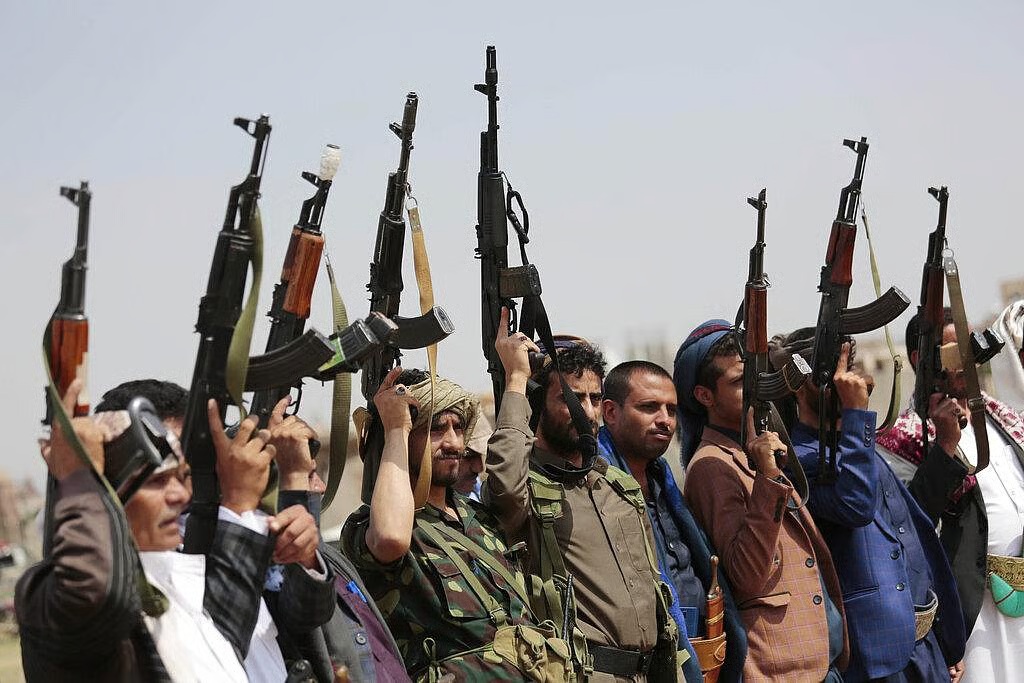A new report has revealed that arms dealers linked to Yemen’s Houthi militants have been openly using social media platforms X (formerly Twitter) and Meta-owned WhatsApp to traffic weapons, including American-made firearms, despite both companies’ policies prohibiting such activity.
Local media reports say the Washington, D.C.-based Tech Transparency Project (TTP), which monitors tech industry accountability, discovered over 190 accounts engaged in arms sales on these platforms.
The sellers, reportedly connected to the Iran-backed Houthi group, have maintained weapon storefronts online for months, some even for years.
Among the items advertised were grenade launchers, assault rifles, and heavy-duty machine guns, with several pieces bearing markings like “Property of U.S. Govt” or “NATO.”
The accounts, many operating out of Houthi-controlled Sana’a, not only showcased weapons for sale but often expressed support for the rebel group.
This rebel group is designated a terrorist organization by the U.S., Canada, and others.
While X and Meta officially ban weapons sales, TTP found that numerous sellers were leveraging paid features like X Premium and WhatsApp Business.
Some even used the platforms’ tools to solicit donations or display curated catalogs of firearms, making their digital storefronts resemble legitimate online businesses.
Katie Paul, TTP’s director, criticized the platforms for turning a blind eye.
“Both X and WhatsApp have clear policies against weapons sales, yet they’re enabling arms traffickers affiliated with a U.S.-designated terrorist group.
In doing so, they’re potentially putting U.S. national security at risk—and profiting from it,” she said.
TTP’s report comes as both platforms scale back content moderation efforts.
X, under Elon Musk’s ownership, laid off the majority of its trust and safety team in 2022.
Meta, too, has reduced its moderation workforce and signaled a shift away from aggressive content enforcement, particularly following criticism from figures like Donald Trump.
One alarming example cited in the report included an “unboxing” video posted by a Premium X account, showing an American M249 SAW light machine gun, standard issue in the U.S. military.
Other posts featured promotional content for assault rifles, some of which were advertised directly beneath mainstream ads, including one for Tesla accessories.
This suggests the platforms could be inadvertently earning revenue from content promoting illegal arms deals.
Some of the arms dealers even responded directly to Elon Musk’s posts.
When Musk shared a video of himself firing a sniper rifle last year, three Houthi-linked sellers replied with ads for their own firearms, including AR-15s.
WhatsApp, meanwhile, was found to host dozens of Business accounts displaying weapon inventories using the app’s “catalog” feature.
One seller showcased a pistol adorned with U.S. national imagery and slogans like “Preserve, Protect, Defend.”
A WhatsApp spokesperson claimed the company takes swift action against accounts tied to designated terrorist groups.
After being alerted by the Guardian, WhatsApp banned two accounts flagged in the TTP report, stating it does not profit from such activity.
However, the company did not explain how these accounts had bypassed review processes designed to prevent misuse.
Meta and X declined to comment on the full extent of TTP’s findings.
Experts believe the trafficking is a reflection of broader arms smuggling networks in the region.
Taimur Khan, an analyst with Conflict Armament Research, said some of the weapons being sold may date back to U.S. military aid supplied to Yemeni government forces before the Houthi uprising in 2014, arms that were later seized during the conflict.
Others, he suggested, were likely smuggled more recently through Gulf states or obtained via Iran.
In January, the U.S. imposed sanctions on a Houthi-linked smuggling network accused of working with Iran’s Revolutionary Guard to procure tens of millions of dollars’ worth of Russian arms.
“The variety of weapons being offered reflects multiple supply routes, some dating back a decade, others far more recent,” Khan noted.
Despite clear rules prohibiting weapons sales, TTP’s investigation underscores how social media’s loosening grip on moderation is creating dangerous loopholes for arms traffickers, allowing terrorist-linked actors to operate freely, and in plain sight.



